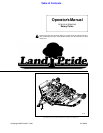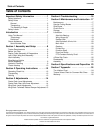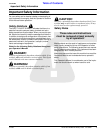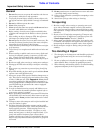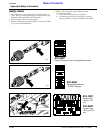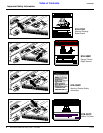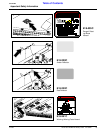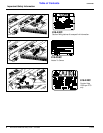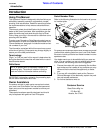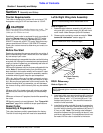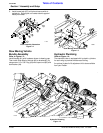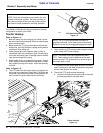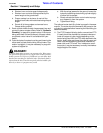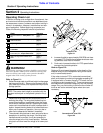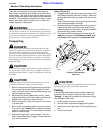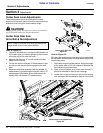
2
Important Safety Information
RC45180 & RCM45180 Rotary Cutter 312-382M 7/14/08
Land Pride
Table of Contents
General
1. Do not allow anyone to operate this machine who has not
been properly trained in its safe operation.
2. To prevent personal injury caused by thrown objects, the
use of front and rear safety shields is strongly recommend-
ed.
3. Do not let children operate the cutter.
4. Never allow passengers.
5. Never operate the cutter near people and do not stand near
the cutter while blades are in motion.
6. Before cutting, clear the area of objects and debris that
could become entangled in the blades or thrown from the
cutter.
7. After striking an object, disengage PTO, shut off tractor
and inspect for damage before continuing.
8. Do not operate the cutter in reverse unless necessary. De-
bris may be thrown from the front of the cutter; therefore,
increasing the risk of injury to the operator.
9. Check the cutter periodically for loose hardware and tight-
en if necessary.
10. Travel slowly over rough terrain and be alert to holes and
gullies.
11. When traveling on public roads, use accessory lights and
devices for adequate warning to operators of other vehi-
cles. Comply with all Federal, State, and Local laws.
12. Never operate the cutter while in the raised transport posi-
tion.
13. Be alert to traffic when crossing or cutting near roadways.
14. Disengage the PTO when raised for transport or backing
up.
15. Wear proper eye protection to prevent injury from flying
objects.
16. Keep PTO shielding in place and in good condition. do not
operate cutter with shields missing.
17. Always use proper PTO speed or machine damage may re-
sult. This cutter is designed to be used with a tractor using
a 540 or 1,000 rpm rear PTO. Important: Never should
a machine equipped for 540 rpm PTO be operated by a
tractor equipped with a 1,000 rpm PTO nor should a 1,000
rpm PTO machine be operated with a tractor equipped
with a 540 rpm PTO.
18. In order to maintain steering control, add ballast to trac-
tor. To determine the amount of ballast required refer to
your tractor operator’s manual.
19. Before performing maintenance, disconnect PTO driveline
and hydraulic hoses and securely block cutter on safe sup-
porting stands. Do not position stands under axle or wheel
supports.
20. Transport cutter with transport axle lock pin installed and
wing lock latches in place.
21. Escaping hydraulic fluid under pressure can have suffi-
cient force to penetrate the skin. Check all hydraulic hoses
before applying pressure. Fluid escaping from a very
small hole can be almost invisible. Use paper or card-
board, not body parts, to check for suspected leaks. If in-
jured, seek medical assistance from a doctor that is
familiar with this type of injury. Foreign fluids in the tissue
must be surgically removed within a few hours or gangrene
will result.
22. Do not permit anyone to stand between tractor and cutter
- especially during tractor hook-up.
23. Purge air from hydraulic system before attempting to raise
or lower wings.
24. Stand clear of wings when raising or lowering.
Transporting
1. Be alert to traffic when crossing or operating near road-
ways. Always maintain complete control of the machine.
Know your state and local laws concerning highway safety
and regulations. Comply with these laws when transporting
machinery.
2. Do not exceed 15 mph when trasnporting. Transport only
with a farm tractor of sufficient size and horse power. See
“Tractor Requirements” Section 1, PAGE 8.
3. Always make sure flashing safety lights, slow moving vehi-
cle emblem, and reflectors are in place and visible prior to
transporting the machine on public roads, when required.
4. Do not transport at night or during other periods of poor
visibility.
Tire Handling & Repair
1. Tire changing can be dangerous and should be preformed
by trained personnel using the correct tools and equip-
ment.
2. Do not re-inflate a tire that has been run flat or seriously
under inflated. Have it checked by qualified personnel.
3. When removing and installing wheels, use wheel handling
equipment adequate for the weight involved.



